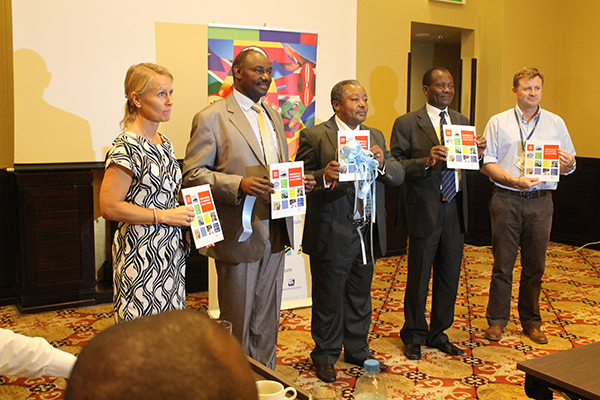Encouraging results achieved over the past year, including investments at key ports have resulted in reduced cargo transit times on East Africa’s main transport corridors, and accelerated implementation of the EAC’s Single Customs Territory. Harmonisation of product standards has expanded the EAC trade basket says TMA Annual Report.
Dar es Salaam, 30 April 2015. Investments in trade infrastructure as well as the dismantling of bureaucratic and procedural barriers to economic integration, is positioning the EAC region as the destination of choice for doing business, TradeMark Africa (TMA) said today as they launched their annual report covering the period 2013/2014.

TMA further stated that its partnership with the East African Governments has resulted to great progress in delivering 7 key One Stop Border Posts (OSBP) across East Africa this year to increase physical access to markets for both formal and informal traders. Pilot operations at the Kobero/Kabanga between Tanzania and Burundi borders already indicate a two day reduction in transit times at Kabanga for cargo trucks, as well as reduction in tedious formalities for traders which have had adverse impact on time and costs of business in the past.
This announcement was made during the presentation of the organization’s annual report for 2014, which was held at The Serena Hotel in Dar es salaam, Tanzania. The event was officiated by Tanzania’s Permanent Secretary in the Ministry of East Africa Cooperation Joyce Mapunjo.
In her remarks, read by George Lauwo, Director in the Ministry, she expressed her appreciation of TMA work in East Africa and Tanzania in particular;
“We are very pleased with our partnership with TMA who continue to work with partners to in the region to reduce trade costs in the region. Significant progress has been made on reducing non-tariff barriers in the region with the support of an innovative and world winning SMS based system developed by the Tanzania Chamber of Commerce and Industry. Similarly improvements at the Dar port have started taking shape to make it a world class port and facilitate trade for the greater Eastern African region.”
The Annual Report details TMA’s vision of enhancing interconnectedness in the region through trade by highlighting some of the successful projects they have supported. Notable among these is the recent signing of the Mombasa Port Community Charter, witnessed by Kenya’s President, H.E Uhuru Kenyatta, by 25 government and private sector agencies who committed to support initiatives that will increase efficiency at the Mombasa Port and the Northern corridor.
Giving his remarks, TMA Tanzania Country Director Dr. Josaphat Kweka reported that some of the key results included: a reduction of average time to clear goods at Mombasa port and transport them to Kampala to 4 days, reduction in the number of customs declarations by 90% leading to an increase in trade volumes, an example of fuel imports into Uganda which have increased from 32.1million litres to 108 million litres.
He added, “The results presented in this Annual Report point to an ever improving trade environment which is expected to spur investments and ultimately benefit the citizens of East Africa. TMA is playing an important role as a catalyst in mobilizing around US$600 million at Dar es Salaam Port to improve its performance through better infrastructure and port operations. Our partnerships at both Mombasa and Dar ports involve an innovative approach mixing both hardware and software solutions.”
More importantly, TMA has made strides to support informal trade across borders, which is often the lifeline of most rural livelihoods. Since these traders do not use available formal systems and structures for their transactions, it is difficult for regional trade policy initiatives to have any significant impact on their lives. There is therefore a continued effort to ensure these economically disadvantaged populations have access to markets. One of the ways in which TMA has done this is by facilitating the formation of cooperatives for informal women traders which have enabled them educate their members, access finance as a group, and engage formally with border officials.
The Annual Report indicates the challenges that the organization faced in the last year especially from external factors such as increased threat of violence and terrorism. However they hope to see a 10 % increase in the total value of exports from the EAC region and a 25% increase in intra-regional trade exports when compared to total exports in the region by 2016.
Source: TradeMark Africa (TMA)
TradeMark Africa (TMA) is an aid-for-trade organisation that was established with the aim of growing prosperity in East Africa through increased trade. TradeMark Africa (TMA) operates on a not-for-profit basis and is funded by the development agencies of the following countries: Belgium, Canada, Denmark, Finland, the Netherlands, UK, and USA. TradeMark Africa (TMA) works closely with East African Community (EAC) institutions, national governments, the private sector and civil society organisations.















